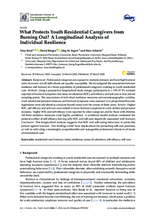Displaying 141 - 150 of 505
This webinar focused on the newly released technical note on Social Service Workforce Safety and Wellbeing during the COVID-19 Response.
This briefing explores the importance of self-care for parents and carers, whilst outlining some ‘top-tips’ and helpful resources that can be accessed online.
The aim of this quantitative, inferential research was to investigate how working with vulnerable and abused children and families has an impact on child protection service workers in South Africa.
This article presents findings from an exploratory in-depth qualitative research project with the objective of exploring the knowledge that social workers use to make decisions regarding permanency arrangements for Looked after Children.
This article argues that child protection agencies must provide mandatory training about the Aboriginal experience within the welfare state and the resultant trauma that exists in Australian Indigenous communities.
This study investigated the association between resilience and burnout in a Swiss population of professional caregivers working in youth residential care.
The present study had two goals: 1) To conduct a systematic scoping review of the literature on interventions purporting to develop and/or enhance emotional intelligence (EI)-related competencies in child welfare professionals, whether those interventions be at the caseworker, supervisor, or organizational level; 2) To consider future directions for the teaching and enhancement of EI competencies for child welfare professionals.
This article describes the impact on social services of an innovative model of family care in Moshi, Tanzania, aimed at orphaned children and youth who are affected by HIV/AIDS and their caregivers.
This article reports a part of a qualitative study to address the questions of what and how international organizations have been engaging in the professionalization of social work services for disadvantaged children in Vietnam, taking five international organizations as the unit of analysis.
This qualitative study, conducted in Portugal, aimed to understand professionals' perspectives on the collaborative processes between the Early Childhood Intervention (ECI) and the Child Protection Systems.


